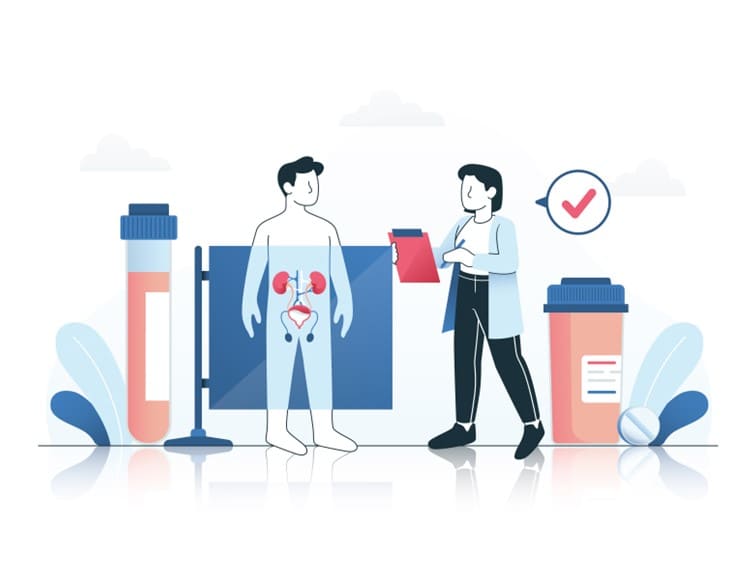Albumin is a protein normally found in the blood. An uACR is the urine albumin-creatinine ratio. This helps in revealing whether you have albumin in your urine.
Your kidneys filter blood. This is their main job. During filtration, your kidneys remove things your body doesn’t need, like toxic wastes and extra water.
They keep important things inside your blood, like protein, red blood cells, etc.
If kidneys are healthy, they should let only very little protein go into your urine – or even none. But if the filtration channels of the kidneys are damaged, protein can “leak” out of the kidneys into your urine.
People whose kidneys filter high albumin in their urine are at an increased risk of having kidney disease which will progress to kidney failure.
How is the uACR tested?
The uACR is a simple urine test. Only a small amount of your urine is needed (about 50ml ) to do the test. It’s important to collect early morning urine. Do not do home tests as the report may not be accurate. Please collect fresh urine samples in the lab. Your urine will be analyzed for the presence of any blood or protein
What does the uACR (urine albumin-creatinine ratio) test result mean?
Less than 30mg/g of albumin in the urine is a normal test. If the amount of albumin in the urine is above 30 mg/g – it means, you have kidney disease even if your kidney functions are normal.
Doctors don’t rely on a single test They will ask for repeat tests in 1 -2 weeks to confirm the presence of abnormal levels of protein in urine.
During the three months of repeated testing if two results show high levels, then it is a sign of kidney disease.
What causes high albumin levels in the urine?
Sometimes simple conditions like fever, prolonged standing, heat exhaustion, and rigorous exercise can cause some protein leak in the urine.
Hence it’s important to recheck the tests 2-3 times a few weeks apart to confirm the albumin leak in the urine.
Some of the causes of protein leak in urine can be Diabetes, High Blood pressure, Inflammation in kidneys, chronic scarring of kidneys, urine infections
What other tests are needed to confirm kidney disease?
You will need blood tests to assess your kidney functions and other urine tests to check for any urine infections.
You will need to get an ultrasound or CT scan done to get a picture of your kidneys and urinary tract. This tells your doctor about the size and structure of your kidneys, and whether you have a problem like a kidney stone.
A kidney biopsy is done in some cases to check for the exact cause of kidney disease. This test tells about the cause and the extent of kidney damage, which helps with the planning of treatment. It’s a very simple procedure and your doctor will explain to you in detail how it is done.
What can you do to decrease or stop albuminuria?
- The treatment depends on the cause of the protein leak in urine.
- The lower the blood pressure, the lower the protein leak in urine
- Your doctor will most likely prescribe a special type of blood pressure medicine that can help decrease or stop you from losing albumin in your urine.
- You should follow a diet that is low in salt.
What else can you do to protect your kidney function and prevent kidney damage?
- Check your kidneys at least every 3 months if you have protein in your urine.
- All it requires is a simple blood test and urine tests
- If you have diabetes, control your blood sugar.
- If you have high blood pressure, you should control your blood pressure.
- In general, if you have CKD, avoid painkillers such as ibuprofen and naproxen.
- Do not smoke.
- Exercise and follow a healthy diet that’s low in sugar, salt, and saturated fat, but high in fresh fruits, vegetables, whole grains, and fish.
- Avoid highly processed foods.
- Lose weight if your BMI is more than 25.

Leave a Reply